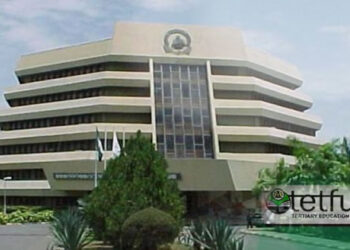The Managing Director of the Nigerian Education Loan Fund (NELFUND), Mr. Akintunde Sawyerr, has announced that students enrolled in federal tertiary institutions will be given priority in the rollout of the loan scheme.
This disclosure was made during a press conference held in Abuja on Monday, focusing on pre-application sensitization regarding the loan scheme.
Sawyerr emphasized that the Fund would fulfill its obligations to federal universities, polytechnics, and colleges of education that have completed and uploaded their students’ data on its dashboard.
What he said
Sawyerr stressed that the only means for students to be eligible to apply for the loan is by having their data uploaded onto the Fund’s dashboard by their respective institutions.
NELFUND has collaborated with these institutions to ensure a smooth upload process, with the loan amount being disbursed directly to the beneficiaries through their institutions, he said.
- Calling on federal tertiary institutions that have not yet uploaded their students’ details to do so, Sawyerr announced that the loan application would open on May 24.
- While the scheme commences with federal institutions, it will eventually extend to state institutions as well.
“The loan application will be opened on May 24. We are starting with the federal tertiary institutions, but the loan will, eventually, be rolled out to state institutions too,’’ he said.
Regarding repayment, beneficiaries are expected to start repaying the loan two years after completing their National Youth Service Corps (NYSC) program, provided they have secured employment.
- Repayment is mandatory for all beneficiaries, regardless of their employment location post-NYSC.
Addressing concerns about beneficiaries facing death, mental or physical illness, Sawyerr revealed that the fund is considering an insurance model to manage bad loans.
- He also highlighted provisions for debt forgiveness in the NELFund establishment Act.
“The first thing we are doing is to try to make sure that we have adequate information about the application for the loan, as much as possible.
“We need to know that those who applied for the loan are bona fide Nigerian citizens and they are of good standing, and we have various ways to know that.
“We are working with security agencies to ensure the people who are applying for this loan are not people who may want to defraud the system.
“We will also follow up on the beneficiaries each year they apply and ensure we are in constant communication with them.
“We are looking at an insurance model to ensure loans that are bad, are handled. This will help to protect tax-payers money,” he said.
Sawyerr emphasized the importance of ensuring the integrity of the loan application process, stating that measures are in place to verify applicants’ eligibility and prevent fraud. Security agencies are involved in this verification process, he noted.
What you should know
Encouraging students to apply, Sawyerr directed them to log into the NELFUND portal via www.nelf.gov.ng and create an account using their existing credentials.
Applicants will need to provide various documents, including their JAMB admission letter, NIN, BVN, personal details, academic information, and financial needs.
The Nigerian Education Loan Fund (NELFUND) was established under the revised Student Loan Act of 2024 to provide interest-free loans to Nigerian students pursuing higher education, vocational training, and skill development programs.
- This initiative aims to remove financial barriers and make education more accessible to all Nigerian students, regardless of their economic background.
- The primary sources of funding for NELFUND include a percentage of taxes, levies, and duties collected by the Federal Inland Revenue Service (FIRS), Nigerian Immigration Service, and Nigerian Customs Service, amounting to 1% of their total revenues
- Additionally, the fund will receive contributions from the profits generated by the government’s natural resource exploitation, education bonds, endowment fund schemes, and donations from individuals and organizations.
The loans cover tuition, fees, and maintenance costs, The repayment process starts two years after the beneficiary completes the NYSC program.

















